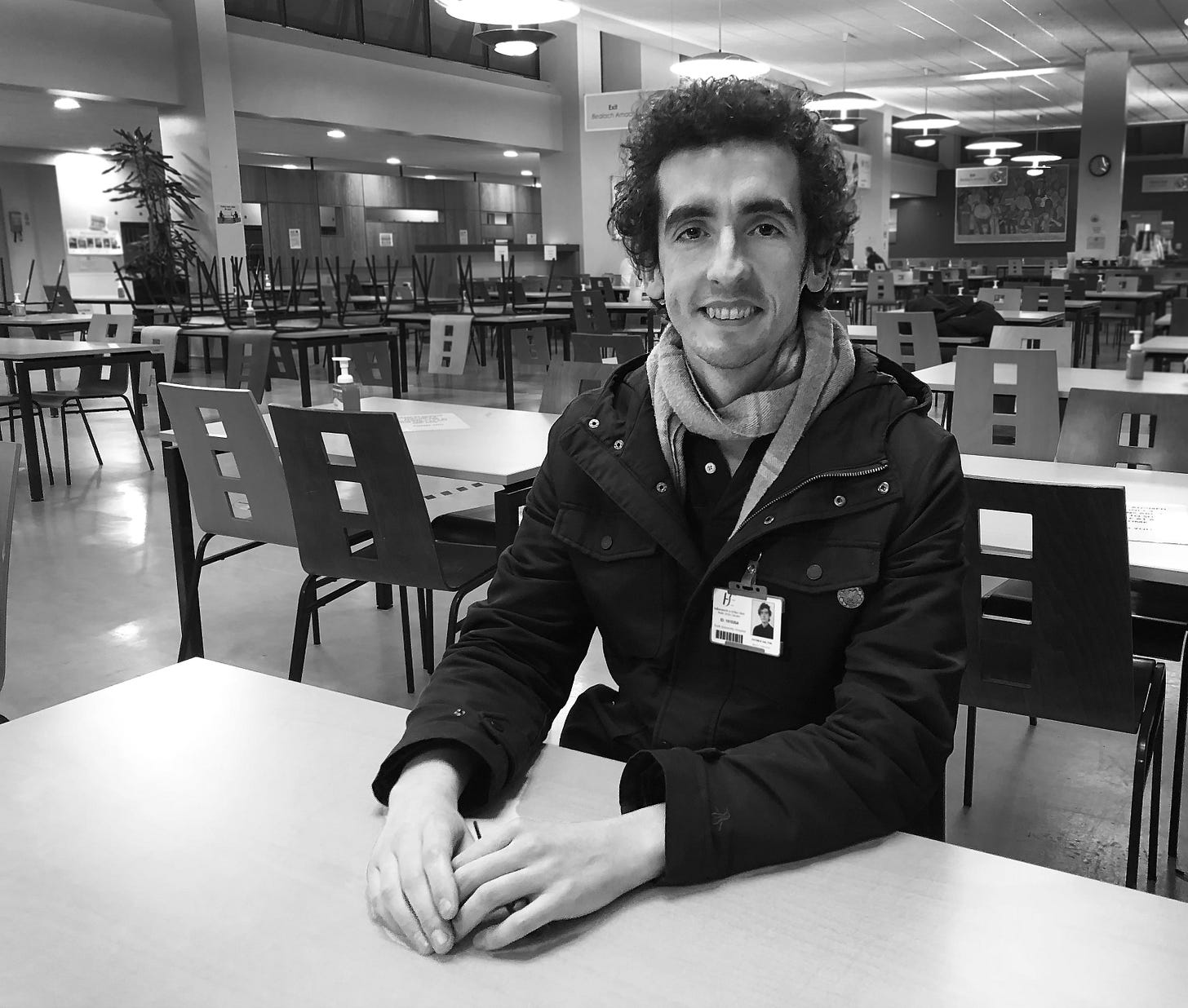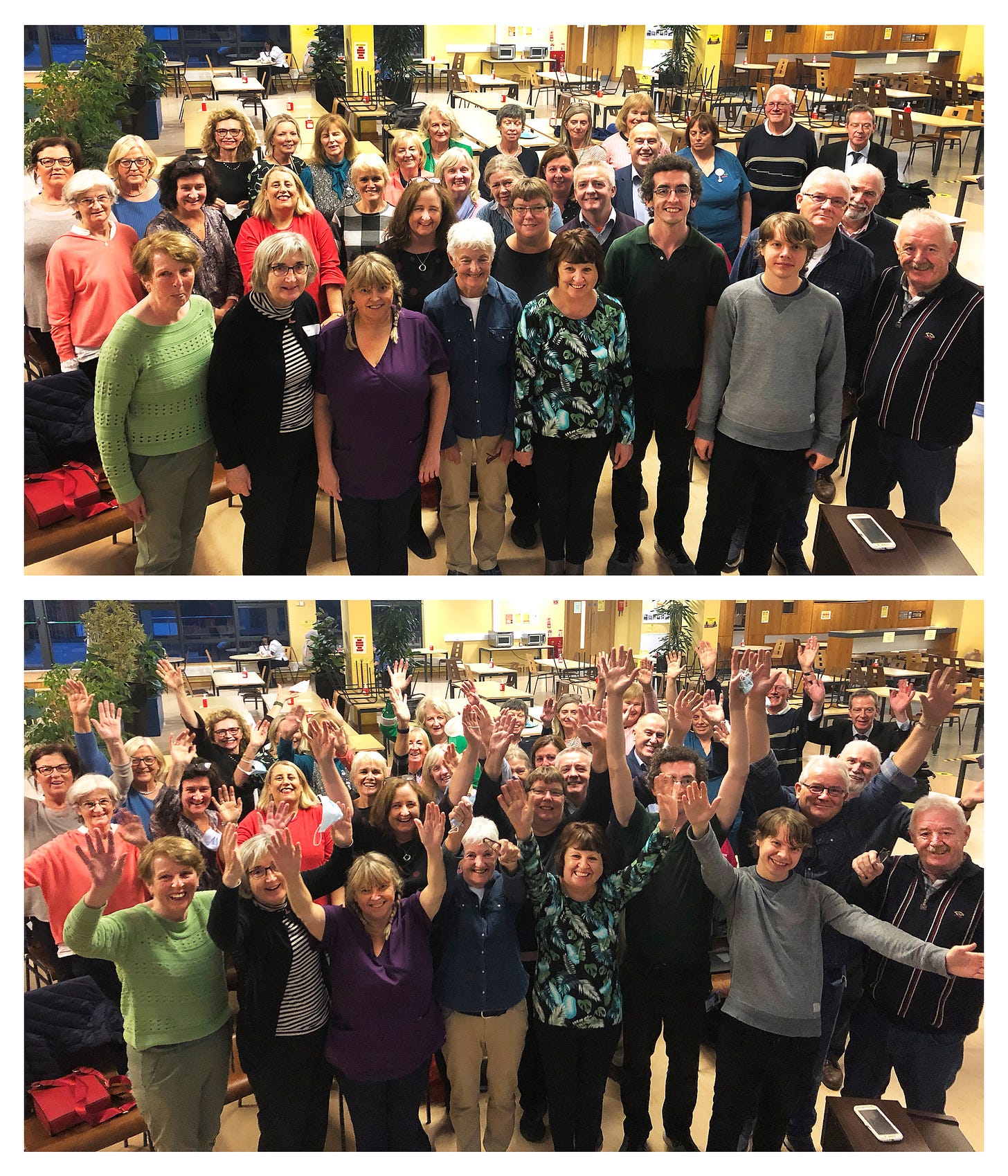Meet Scrubs: the Cork University Hospital choir
The CUH workplace choir's uplifting music is the perfect antidote to the stresses of working in healthcare, members say.

It’s a dull Tuesday evening in autumn, in those gloomy weeks where the gradual retreat of the light and the inevitability of winter starts to make itself felt.
It’s six o’clock and in the Cork University Hospital staff canteen, healthcare workers are having their breaks under harsh fluorescent lighting, with precious little help from the evening sun.
A hospital is a sombre place.
Outside, under ominously beckoning rain clouds, women in dressing gowns and runners make earnest calls to family; taxis ebb and flow; an elderly man is helped to walk by a female relative; a stern voice reminds patients not to smoke.
Suddenly, in the canteen, the sound of voices is raised. Many voices, singing softly. Some young nursing staff glance up from their trays. From the corner of the room, it’s the sound of 35 people starting to sing Mr Blue Sky.
Scrubs are the CUH workplace choir. Founded in 2015, they’ve been providing a little light relief from the heavy work of healthcare ever since, under the tutelage and guidance of musical director Pat D’Alton.
They perform in scrubs, of course, with Pat wearing a white coat and stethoscope; their repertoire, chosen largely by the choir members themselves, is mostly arrangements of well-known upbeat pop songs: Bohemian Rhapsody, Coldplay’s Fix You. The Rhythm of Life is their party piece. Sia’s Titanium, with which they won last year’s Workplace Choir competition at Cork Choral Festival, has been a huge hit.
Oncology nurse Nessa Gallwey tells me Titanium is her favourite, as do several other choir members. Scrubs is open to both serving staff at CUH and retired staff, and there are remarkably few doctors and nurses amongst their 60 members: there are hospital porters, staff from the dental hospital, laboratory and clerical staff as well as retirees.
But there are two staff members from the Oncology unit: nurse Nessa and consultant oncologist Dr Oonagh Gilligan are both alto sopranos. As the choir continue to work on Mr Blue Sky, Nessa and Oonagh come over to say hi.
Both say that singing is a fantastic stress reliever. Oonagh say she’ll make sure to get down to practice even if it means putting in extra hours afterwards. The informal, relaxed atmosphere fostered in the choir is a big help: “I might actually need to step out and take a call during practice, or I might get in late or have to leave early,” Oonagh says. “That’s all fine with Pat; it’s really relaxed.”
Of course, we’re just coming out of a couple of years where working in healthcare has been particularly stressful.
All kinds of bands and musicians found themselves unable to congregate to practice and perform during the Covid crisis, choirs included. Scrubs tried to keep going, with regular Zoom meetings, throughout.
“Pat was just amazing,” Oonagh says. “He really kept it going and it kept our spirits up, in a time where, really, we were coming into work quite scared, sometimes not knowing much other than that we had to keep going.”
“You can’t sing together on Zoom, but Pat would sing into the screen, get us to practice things,” Nessa adds.

But nothing is a substitute for the real thing, the feeling of getting together to sing. The choir have recently resumed in-person practice in the staff canteen, although they are - it being a hospital setting - still wearing masks while singing.
“Before Covid, sometimes we used to practice out in the atrium,” Nessa says. “The patients would come out onto the balconies on all the floors above us, which was lovely.”
Both women are tentative about attributing any actual healing powers to song, though. “Well…I think it’s very soothing and that has to be a good thing,” Oonagh says.
Terry from Finance
Terry Kiely sings bass with the choir. Finance Manager of CUH, he worked in the hospital for 17 years before his retirement last year. He founded Scrubs in 2015, when the Cork University Maternity Hospital Choir, The Ultrasounds, folded.
Scrubs were first formed with the idea of taking part in Lyric FM’s Choir in the workplace competition, and they reached the national final in their first year entering.
“But we didn’t start Scrubs for the competitiveness,” Terry says. “We started it for the social element, for health and wellbeing. I worked in Finance and I wouldn’t have known people from Physio or Dental Hospital or Mental Health unit or other departments until we started the choir. It opened up the hospital for people in that way.”
Cork University Hospital is enormous. There are around 4,000 jobs on the hospital campus, but because some of these are part-time and shared, Terry estimates that there could be anything up to 5,000 staff. Was it hard to recruit choir members when Scrubs first started?
“We put out the invite and we were amazed at the response,” Terry says. “We thought we’d get 10 or 15, but we were absolutely swamped.”
“We don’t require that people come every week because we understand people might be doing shift work. We’re happy if people can come to most rehearsals. And we have about 60 in total at the moment.”
Lots of the members of Scrubs will have little or no prior experience, or maybe not since singing in school choirs, but singing in a group is brilliant for confidence, Terry says.
He didn’t start singing himself until he was 40. “I never sang until I went to Dublin for some work and I went to the choral society,” he says with a smile. “I balked the first night and walked away, but I said to myself, ‘no-one knows me, I’ll go again.’ So I did, and I got a great welcome, and when I moved back to Cork I tried a few choirs. They’re all different but you learn a bit from all of them, and then I used that experience when I was trying to set this one up.”
“We have a separate night out where we go to the pub for a singsong and everyone does their party piece and whether you’ve a note in your head or not you’ll get the same respect, but in a choir you can sing along: you don’t have to be a soloist.”
Terry has now stepped back from running the choir following his retirement, and there’s a committee, but he says for the many retirees in Scrubs, it’s a great way to stay in touch with their former workplace.
Attracting male singers and attracting current staff members are two challenges the choir currently has. They try to keep their performing schedule limited the better to facilitate working members.
Scrubs Got Talent
“The biggest thing we did was Britain’s Got Talent,” Terry says. “We went over to Birmingham to sing in front of Simon and the other judges. We didn’t make the TV show but it was a great experience for the choir. And we went to Vienna in 2018 to take part in the winter festival.”
“Covid came and put a stop to all that, but we’re back up and running now: we had a weekend in Dungarvan recently and that was great for the bonding because often we’d only see each other the one night a week. “
The choir start working on a new song: an arrangement of Proud Mary, complete with choregraphed moves. Accompanist Joe Norton plays the piano while Pat D’Alton conducts, stopping the singers a few times to improve their delivery and acting out the moves on the “Rollin', rollin’, rollin’ on the river” bit.
It looks like such good fun it’s hard not to join in.
Pat’s been the musical director of Scrubs since it was founded, but for the past two years, since he completed his MA in Music Therapy, Pat has also been employed as a music therapist in CUH, on the children’s Puffin ward.
“Working here now myself, I have a bigger understanding of what people might be doing during their working day and how much of a relief and release this is,” he says. “It’s lovely to be part of that picture.”
Being back practicing in the canteen “just reminds you that you’re here in a workplace. There are retired staff in Scrubs, but also people who have just come off their shifts working long, long days and you don’t know what they might have dealt with that day.”
Pat is a big believer in singing for health and wellbeing: “Communal singing goes right the way back to chanting, I think. And then there’s the adrenalin rush they get from being on stage and performing. It’s a real high. they might not be doing it profressionally, but there’s a great buzz out of it and that sense of unity and togetherness.”
As a prolific performing and recording musician himself, what’s it like working with a choir with such a necessarily relaxed pace?
“Well, to an extent, you reset your goals and objectives: in a musical context, you say, ‘what can we achieve here?’ And as you get to know them you get to know their strengths and weaknesses. A lot of it takes a bit longer: Rhythm of Life is complex enough and would have taken a couple of months to get to a place where it’s good, but now, with two or three years of singing it in different competitions and shows and rehearsals, they can do it at the drop of a hat.”
“But I suppose the delayed gratification part is there: if it takes several months to make something good, that’s the reward, too. If you brought a piece to a professional choir and they were able to get it right away, that wouldn’t feel the same. It would be rewarding in a different way.”
“In a musical context you’re more of a facilitator than just director. But if I were to put more pressure on them it just….wouldn’t be as much fun,” he says with a smile.






